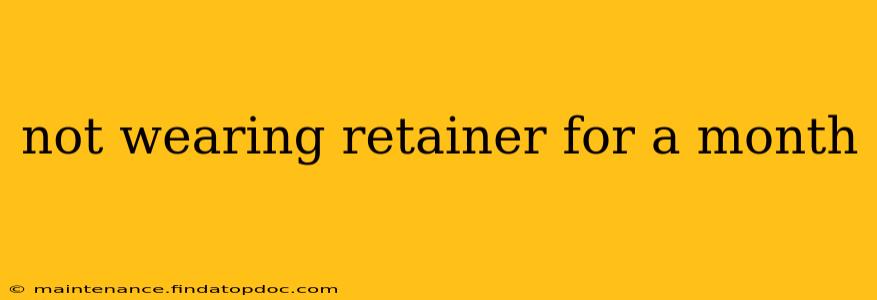Forgetting to wear your retainer, even for a short period, can be a common concern for orthodontic patients. But what exactly happens if you don't wear your retainer for a month? The answer depends on several factors, including the type of retainer you have, the severity of your previous misalignment, and your individual tooth movement tendencies. This article explores the potential consequences and offers advice on how to best manage your retainer wear.
What Happens if I Don't Wear My Retainer for a Month?
The most significant risk of neglecting your retainer for a prolonged period, like a month, is teeth shifting. Your teeth are constantly trying to return to their original positions, and the retainer prevents this relapse. Without it, your teeth may gradually shift, potentially leading to:
- Minor Crowding: Teeth may become slightly more crowded than they were after your braces were removed. This may not be drastic but can be noticeable to you.
- Spacing Changes: Gaps between your teeth might reappear or widen.
- Rotation: Individual teeth could rotate, altering their position within your smile.
- Overbite or Underbite Recurrence: In more severe cases, the correction of your overbite or underbite could partially reverse.
The extent of the shift will vary from person to person. Some individuals might experience minimal changes, while others could see more significant movement.
How Much Can My Teeth Shift in a Month?
The degree of tooth movement in a month without a retainer is unpredictable. It depends greatly on individual factors. Some individuals experience noticeable shifting within weeks, while others may see only minor changes even after several months. The severity of your initial misalignment plays a crucial role; individuals with more severe crowding or bite problems are likely to see more dramatic changes if they stop wearing their retainers.
What if I've Only Missed a Few Days?
Missing a few days of retainer wear is less likely to cause significant shifting, especially if you resume wearing it consistently. However, it's still crucial to make wearing your retainer a habit to maintain the results of your orthodontic treatment. Even short lapses can contribute to eventual relapse.
What Type of Retainer Do I Have and How Does It Affect Relapse?
There are several types of retainers, and their effectiveness varies.
- Fixed Retainers: These are cemented to the back of your teeth and are worn permanently. They significantly reduce the risk of relapse, but neglecting other retainers (like removable ones) may impact results.
- Removable Retainers (Hawley or Essix): These are the most common type of retainer. Consistent wear is crucial to maintain the position of your teeth. Neglecting to wear these retainers, even for a short period, increases the chances of relapse.
Can I Reverse the Shifting After Not Wearing My Retainer for a Month?
Yes, it's often possible to reverse some of the shifting that occurs after a month without a retainer. However, it may require additional orthodontic treatment, such as another round of braces or Invisalign. The level of correction needed will depend on how much your teeth have shifted. It is always best to talk to your orthodontist. They will assess your situation and recommend the best course of action.
What Should I Do if I've Forgotten to Wear My Retainer?
The most important thing to do is to resume wearing your retainer immediately. Don't panic; a single month's lapse is not necessarily a catastrophe. But consistent wear going forward is essential. If you notice any significant changes or are concerned about your teeth shifting, contact your orthodontist for an evaluation.
Conclusion
While a month without a retainer may not cause irreversible damage for everyone, it significantly increases the risk of relapse. Maintaining consistent retainer wear is crucial for preserving your straight smile. Regular checkups with your orthodontist are also recommended to monitor your progress and address any concerns. Remember, prevention is always better than cure. Establish a routine and prioritize wearing your retainer.
